
EDMETIC
metrics 2024
Bridging the gap between education and digital innovation.
Introduction
EDMETIC is a premier open access journal dedicated to the field of educational technology and innovation, published by the University of Córdoba, Faculty of Education Sciences. With its ISSN 2254-0059 and E-ISSN 2254-0059, EDMETIC has been serving the academic community since 2012, providing a platform for the dissemination of high-quality research that explores the intersection of education and digital technologies. Situated in the vibrant city of Córdoba, Spain, this journal invites contributions from both established and emerging scholars worldwide. With a commitment to fostering critical discussions and advancements in educational practices, EDMETIC is pivotal for researchers, professionals, and students interested in the dynamic landscape of educational technology. Authors and readers benefit from its open access model, which ensures that groundbreaking research is accessible to all, promoting a culture of knowledge sharing and collaboration.
Metrics 2024
 -
- 1.20
1.20 1.40
1.40 -
-Metrics History
Rank 2024
IF (Web Of Science)
JCI (Web Of Science)
Quartile History
Similar Journals
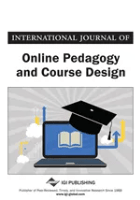
International Journal of Online Pedagogy and Course Design
Exploring the future of online education.The International Journal of Online Pedagogy and Course Design, published by IGI Global, serves as a vital resource for researchers, educators, and practitioners interested in the integration of technology in education. Since its inception in 2017, this journal has focused on the latest advancements in online teaching methodologies, course design, and assessment frameworks, contributing to the dynamic field of educational technology. It is indexed in Scopus and currently ranks Q4 in the Education category, reflecting its growing influence within the academic community. The journal provides an invaluable platform for sharing innovative research and practical insights that enhance online learning experiences, crucial in today’s digitally-driven educational landscape. With an ISSN of 2155-6873 and E-ISSN of 2155-6881, the journal is dedicated to fostering a collaborative environment where ideas and practices in online pedagogy can thrive.
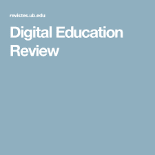
Digital Education Review
Exploring New Frontiers in Digital LearningDigital Education Review, published by the University of Barcelona, stands at the forefront of the Digital and Educational Technology field, offering a valuable platform for researchers, educators, and policymakers since its inception as an Open Access journal in 2010. With an emphasis on innovative practices and critical evaluations in digital education, the journal has garnered an impressive standing within the academic community, achieving rankings of Q3 in Computer Science Applications and Q2 in Education for 2023, alongside a notable position in the 71st percentile of Social Sciences - Education rank (447 out of 1543). The journal aims to foster interdisciplinary dialogue and disseminate research that influences educational transformation through digital means. Based in Spain, the Digital Education Review not only promotes high-quality research but also engages with a global audience, making it a pivotal resource for those dedicated to advancing the understanding of digital educational practices.
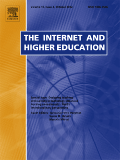
Internet and Higher Education
Navigating the Evolving Landscape of Higher EducationWelcome to Internet and Higher Education, a premier journal published by Elsevier Science Inc, focusing on the dynamic intersection of technology and education. Established in 1998, this journal provides a platform for innovative research and critical discussions in the fields of Computer Networks and Communications, Computer Science Applications, and E-learning, consistently ranked in the Q1 quartile across multiple categories in 2023. With an impressive Scopus ranking placing it in the top 1% of Social Sciences and Computer Science categories, Internet and Higher Education aims to foster interdisciplinary collaboration and advance our understanding of digital learning environments. The journal invites contributions that explore the impact of the internet on higher education, offering tangible insights for educators, administrators, and policymakers alike. Stay updated on the latest findings and trends that are shaping the future of education through technology.
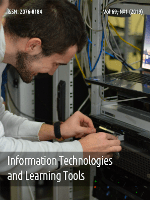
Information Technologies and Learning Tools
Exploring the Future of Learning Through Information Technology.Information Technologies and Learning Tools is a pioneering scholarly journal dedicated to the exploration and dissemination of knowledge within the rapidly evolving field of educational technology. Published by the NATIONAL ACADEMY OF EDUCATIONAL SCIENCES OF UKRAINE, INSTITUTE OF DIGITALIZATION EDUCATION, this journal has maintained its Open Access policy since 2006, ensuring that groundbreaking research is readily available to educators, researchers, and practitioners worldwide. With the ISSN 2076-8184, the journal serves as a critical platform for innovative studies focusing on the integration of information technologies into educational practices, seeking to bridge gaps between digital tools and effective learning methodologies. Despite the absence of specific rankings, its commitment to advancing educational theories and applications positions it as an essential resource for professionals and students striving to enhance learning experiences through technology. As the educational landscape continues to transform, Information Technologies and Learning Tools stands at the forefront, fostering collaboration and knowledge sharing across diverse academic communities.

Contemporary Educational Technology
Empowering Education Through TechnologyContemporary Educational Technology is a premier journal published by BASTAS PUBL LTD - UK, specializing in the dynamic intersection of educational practices and technological advancements. With an E-ISSN of 1309-517X, this journal serves as a vital resource for researchers, educators, and professionals keen to explore innovative solutions and methodologies in education. Ranked in the Q2 category for both Education and Management of Technology and Innovation in 2023, Contemporary Educational Technology boasts impressive Scopus ranks, standing at #187 out of 1543 in the Social Sciences Education field, reflecting its influence and contribution to contemporary research. Through its open-access approach, this journal facilitates the dissemination of knowledge, making cutting-edge research readily available to a global audience. By examining developments from 2018 through 2024, it aims to critically analyze and promote the integration of technology in educational contexts, thereby fostering improved learning outcomes and innovative teaching practices.
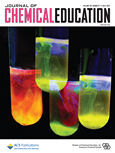
JOURNAL OF CHEMICAL EDUCATION
Igniting Passion for Chemistry Through EducationJOURNAL OF CHEMICAL EDUCATION, published by the American Chemical Society, is a prestigious peer-reviewed journal dedicated to advancing the teaching and learning of chemistry. With a longstanding history spanning from 1924 to 2024, this journal plays a vital role in disseminating innovative research and pedagogical strategies that enhance educational practices in the chemical sciences. It boasts an impressive impact factor, ranking in the Q2 category for both Chemistry (miscellaneous) and Education in 2023, reflecting its significance within the field. The journal's robust Scopus rankings underscore its influence, with a percentile standing of 85th in Social Sciences _ Education and 67th in General Chemistry. Researchers and educators alike will benefit from its rich selection of articles and resources aimed at fostering effective teaching methodologies and improving student engagement in chemistry education. While currently not an open-access journal, readers can access its extensive archive and explore topics that bridge theoretical knowledge and practical application in the realm of chemical education.
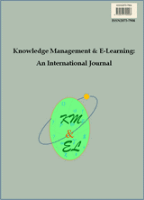
Knowledge Management & E-Learning-An International Journal
Transforming Education with Cutting-Edge Insights.Knowledge Management & E-Learning-An International Journal, published by the Laboratory Knowledge Management & E-Learning University in China, is a pioneering open-access platform that has been advancing the fields of education, e-learning, and technology management since its inception in 2009. With an ISSN of 2073-7904 and a commendable placement in the Q2 quartile across multiple categories including Education and Management of Technology and Innovation, this journal serves as a vital resource for researchers, educators, and practitioners seeking current insights and innovative methodologies in knowledge management and digital learning environments. Its recognition within Scopus, ranking 294th in Social Sciences Education and 106th in Business Management, underscores its significance and the impact of its contributions to the scholarly community. With a focus on fostering interdisciplinary collaboration and promoting the latest research findings, Knowledge Management & E-Learning remains committed to enhancing the dialogue on effective knowledge dissemination and digital pedagogies. Accessing its content is straightforward, as the journal has embraced an open-access policy, making research freely available to a global audience.

Revista Iberoamericana de Educacion
Connecting Theory and Practice in Education Across BordersRevista Iberoamericana de Educacion is a premier academic journal dedicated to the field of education within the Ibero-American context. Published by the Organización Estados Iberoamericanos Educación Ciencia & Cultura (OEI), this Open Access journal has been providing valuable insights and research findings since 1993. With an ISSN of 1022-6508 and E-ISSN of 1681-5653, it serves as a vital resource for educators, researchers, and policymakers striving to enhance educational practices and address contemporary challenges in the region. The journal features a diverse range of articles that explore educational theories, policies, and methodologies, contributing significantly to the discourse on educational reform and innovation. Its commitment to accessibility and dissemination of knowledge makes it an essential tool for those looking to stay abreast of the latest developments in education. Located at Bravo Murillo 38, Madrid 28015, Spain, the Revista Iberoamericana de Educacion continues to foster collaboration and knowledge-sharing across Ibero-America, solidifying its role as a cornerstone in educational research.

Bulletin of the Technical Committee on Learning Technology
Exploring the Intersection of Education and TechnologyBulletin of the Technical Committee on Learning Technology, published by IEEE-INST ELECTRICAL ELECTRONICS ENGINEERS INC, is a pivotal journal that intersects the realms of education and computer science. With a noteworthy ISSN of 2306-0212, this journal serves as a vital platform for disseminating innovative research and development in learning technologies, particularly focusing on technological advancements that enhance educational environments and methodologies. Although coverage in Scopus has been discontinued, the journal's past contributions are reflected in its competitive rankings, with a position of Rank #624 in Social Sciences - Education and Rank #427 in Computer Science - Computer Science Applications. This indicates a solid niche in the academic landscape, making it a valuable resource for researchers, educators, and practitioners seeking to advance the dialogue around technology integration in learning. The Bulletin fosters an open exchange of knowledge and encourages the exploration of emerging technology applications in education, positioning itself as an important component in the ongoing development of learning technologies.

ETR&D-EDUCATIONAL TECHNOLOGY RESEARCH AND DEVELOPMENT
Shaping the Future of Learning with Evidence-Based InsightsETR&D - Educational Technology Research and Development, published by Springer, is a premier journal dedicated to advancing the field of educational technology through rigorous research and development. With a history dating back to 1957, it has established itself as a leading resource for scholars and practitioners, maintaining a remarkable Q1 ranking in Education as of 2023, and standing at an impressive 41st out of 1543 in the Scopus rankings for Social Sciences - Education, placing it in the 97th percentile. This journal aims to bridge the gap between theory and practice, offering in-depth insights into the latest innovations and methodologies in educational technology. As a vital resource for researchers, educators, and technology developers, ETR&D highlights the interplay of technology, pedagogy, and learning environments, driving the evolution of educational practices in a digital era. Although not an open access journal, it provides comprehensive access options for institutional and individual subscribers, ensuring that key findings reach a broad audience. Discover the future of education through ETR&D's influential publications.